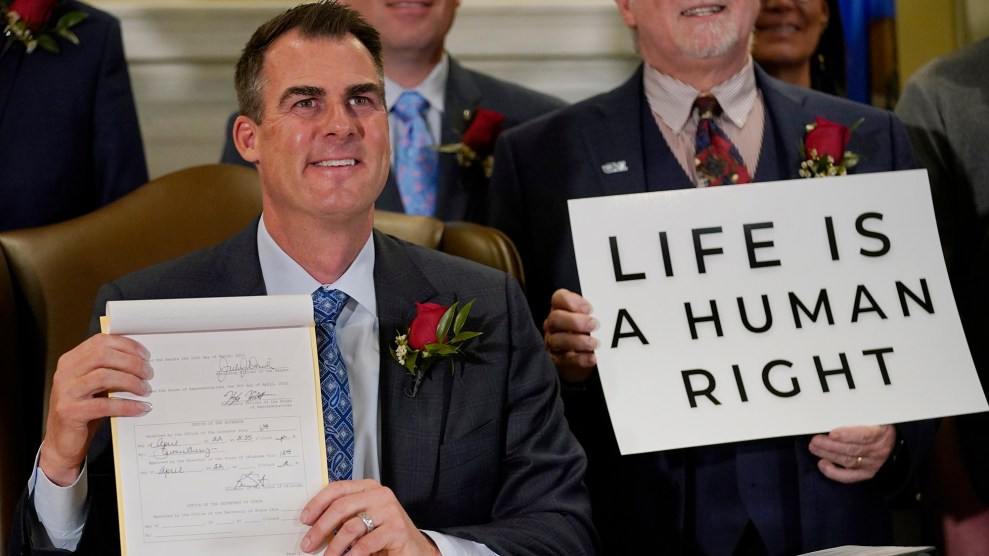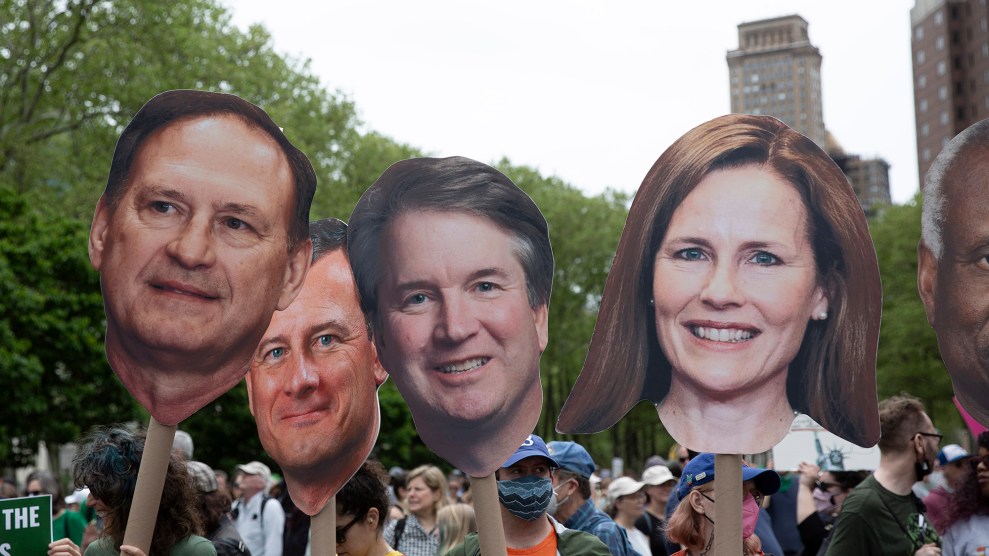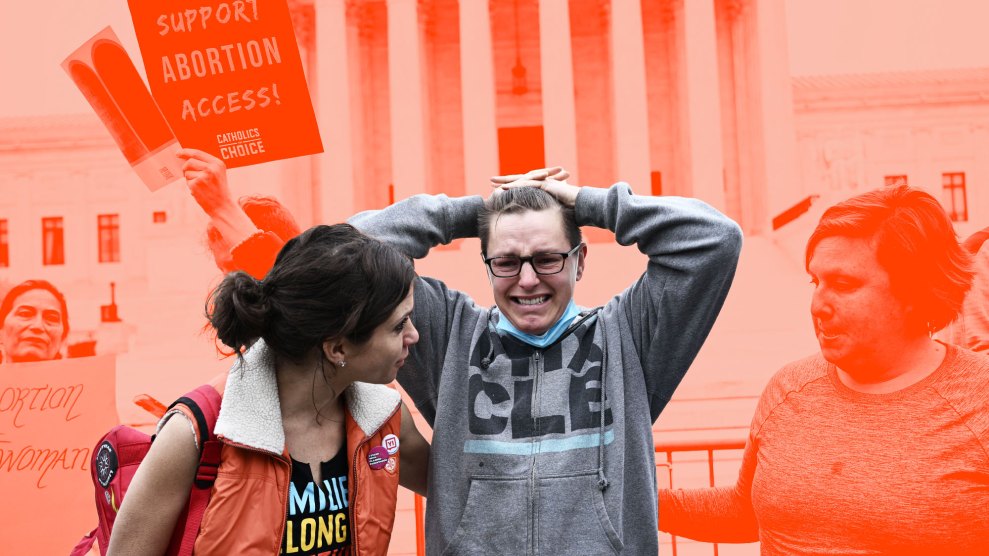Just a day after the Supreme Court issued a radical decision on gun rights, it officially declared Roe v. Wade a dead letter. In all of the tumult surrounding the decision in Dobbs v. Jackson Women’s Health Organization, even eagle-eyed Court watchers would have been forgiven for overlooking one curious detail. After all, it was overlooked when it appeared in the draft opinion that was leaked in May. Nestled among Justice Samuel Alito’s arguments laying waste to nearly 50 years of abortion precedent lurked an unassuming footnote documenting a narrative advanced in amicus briefs submitted to the high court. These “friend of the court” briefs, Justice Alito explained, “present[ed] arguments about the motives” of those favoring “liberal access to abortion,” namely “that some such supporters have been motivated by a desire to suppress the size of the African American population.”
According to Alito, claiming abortion is a tool of racial genocide is not beyond the pale. “[I]t is beyond dispute that Roe has had that demographic effect.” After all, he noted “[a] highly disproportionate percentage of aborted fetuses are black.” As further support for the view that abortion has functioned as a tool of eugenics, Alito cited Justice Clarence Thomas’ separate opinion in 2019’s Box v. Planned Parenthood of Indiana and Kentucky, a challenge to an Indiana law that prohibited abortion where undertaken for reasons of race or sex selection or because of the diagnosis of a fetal anomaly. The court declined to review the law, deferring the question of the constitutionality of such “reason bans” to another day. While Justice Thomas agreed with the decision to decline review, he nonetheless wrote separately to emphasize that the day was coming when the Court would have “to confront the constitutionality of laws like Indiana’s,” which, in his view, merely reflected a “compelling interest in preventing abortion from becoming a tool of modern-day eugenics.”
As evidence of the “eugenic potential” of abortion and reproductive rights, Justice Thomas noted that “[t]he foundations for legalizing abortion in America were laid during the early 20th-century birth-control movement,” which “developed alongside the American eugenics movement.” Indeed, reproductive rights advocates like Margaret Sanger, the founder of Planned Parenthood and the modern birth control movement, and Alan Guttmacher, who served as the President of Planned Parenthood in the 1960s, worked hand in glove with the eugenics movement, endorsing contraception and abortion as effective methods for “controlling the population and improving its quality.” But if the eugenics movement was principally concerned with optimizing the genetic profile of the white race, Sanger and Guttmacher’s commitment to population control through reproductive freedom reflected a shared concern for high maternal mortality rates and a commitment to allowing women to make decisions about childbearing—and the size of their families—for themselves.
Uninterested in this nuance, Justice Thomas maintains that the work of these birth control pioneers was shot through with racial animus. Margaret Sanger, he notes, “campaigned for birth control in black communities”—creating a birth-control clinic in Harlem as well as the “Negro Project,” which worked with Black leaders like W.E.B. DuBois and Black clergy to promote birth control in poor, Southern Black communities. Thomas’ implication is clear: contraception and abortion—the twin pillars of reproductive rights—are not merely rife with “eugenic potential,” they are, put simply, tools of racial injustice.
Justice Alito’s decision to include this footnote, and its not-so-subtle association of abortion with eugenics and racial genocide, in the leaked draft opinion in Dobbs is puzzling, if only because, as a matter of law, it is entirely gratuitous. Having laid out his case that Roe is “egregiously wrong” because the abortion right is unmoored from constitutional text and lacks deep roots in the country’s history and traditions, there was no need to invoke racial eugenics. So, why did Justice Alito, a shrewd tactician when it comes to advancing the conservative legal project, insist on this unusual aside?
Perhaps it was merely an anodyne gesture of collegiality toward Justice Thomas, who, as the most senior justice in the majority, could have kept this plum opinion assignment for himself, but instead allowed Justice Alito the opportunity to spear Roe’s great white whale. After all, Justice Thomas has diligently husbanded the notion of “eugenic abortion” to great effect, helping it to flourish in the lower federal courts, particularly among conservative jurists. When the Sixth Circuit, for example, recently upheld an Ohio law that barred doctors from performing abortions on women who choose to end their pregnancies because the fetus has Down syndrome, the majority opinion and all but one of the concurrences referenced Thomas’ Box concurrence and its condemnation of “eugenic” abortion. Judge Richard Allen Griffin explicitly noted “Nazi Germany’s horrific implementation of eugenics,” musing that the tragic practice of eugenics “continues today with modern-day abortions.”
Colleagueship aside, Alito’s footnote seems like a strategic choice—an effort to till new ground in an opinion that will be dissected and scrutinized for generations to come. With this in mind, the footnote seems less like an inadvertent aside or a gesture of collegiality, and more like a poison pill, laying the foundation for extending the assault on reproductive rights to contraception, with which Margaret Sanger is most closely associated. This prospect is not far-fetched, especially considering that the court has previously justified revisiting and overturning earlier decisions in order to remedy racial injustice—Brown v. Board of Education’s overruling of Plessy v. Ferguson’s separate but equal doctrine is perhaps the most famous example. Indeed, in his own concurrence to the Dobbs majority opinion, Justice Thomas made the case for revisiting—and eventually overruling—precedents securing the right to contraception, same-sex marriage, and same-sex sexuality.
The conservative impulse to use race as a means of toppling reproductive rights has unexpected roots. Over the last 20 years, reproductive justice advocates have made the case that restrictions on abortion and contraception are disproportionately borne by women of color and poor women, and that it is essential to consider reproductive rights in concert with economic and environmental justice, immigration status, disability, and race, class, and sexual orientation. This critique has proved incredibly effective, prompting mainstream reproductive rights groups, like Planned Parenthood and NARAL, to expand their agendas beyond abortion to include things like access to affordable contraception, sex education, pre- and post-natal care, family leave, and childcare.
Conservatives also noted the reproductive justice movement’s success in reframing the debate. In time, the pro-life movement too began to recast antipathy to abortion as a matter of social justice. Responding to claims that abortion was a reasonable choice for women of limited means and resources, the pro-life movement invested heavily in the expansion of crisis pregnancy centers—which sought to dissuade pregnant individuals from abortion, in part by providing free or low-cost access to prenatal testing, prenatal care, diapers, and other newborn essentials.
Simultaneously, the pro-life movement began emphasizing the supposed harms that abortion posed to minority children and their communities. The Radiance Foundation, an antiabortion group, placed billboards in predominately Black neighborhoods staunchly asserting that “Black children are an endangered species.” Life Always, another prominent pro-life group, orchestrated a billboard campaign in minority neighborhoods that proclaimed “The Most Dangerous Place for an African American is in the Womb.” More recently, the tagline Black Lives Matter has been met with retorts from antiabortion groups that unborn Black lives matter.
The right’s embrace of racial justice may seem curious—particularly given the conservative assault on identity politics, anti-discrimination laws, and voting rights protections. But in some respects, this pivot is entirely predictable. It’s not the first time the conservative movement has repackaged some of its core agenda items in the wrappings of racial equity.
Ten years ago, for example, the defense of Second Amendment rights was framed primarily in terms of public safety. But more recently, advocates have recast their support of more robust gun rights as an appeal to racial justice. And once again, Justice Thomas has led the charge. In a separate concurrence in 2010’s McDonald v. City of Chicago, Justice Thomas linked the right to bear arms to thwarted Black citizenship. As he explained, the federal government’s failure to protect Second Amendment rights during Reconstruction “enabled private forces, often with the assistance of local governments, to subjugate the newly freed slaves and their descendants through a wave of private violence designed to drive blacks from the voting booth and force them into peonage, an effective return to slavery.” In conjuring up images of lynchings and other forms of racial violence, Justice Thomas effectively insisted that more expansive gun rights are antidotes to racism.
Justice Thomas reprised these arguments in his majority opinion in New York State Rifle and Pistol Association v. Bruen, the court’s recent decision striking down New York’s concealed carry permitting regime and holding that the Second Amendment protects an individual right to keep and bear arms in public spaces. He noted the systematic efforts to disarm newly freed Blacks and recounted how “blacks used publicly carried weapons to defend themselves and their communities” in the postbellum period. Indeed, in a truly stunning aside, Justice Thomas cited Dred Scott v. Sandford, the 1857 case that precipitated the Civil War, for the view that the right to bear arms was so clearly understood as a marker of citizenship that Chief Justice Roger Taney, the author of Dred Scott, fretted that recognizing Blacks as full citizens would permit them “to keep and carry arms wherever they went.” Not to be outdone on racial wokeness, Justice Alito concurred separately to detail circumstances in which “[o]rdinary citizens frequently use firearms to protect themselves from criminal attack.” In particular, he noted that the court had fielded amicus briefs from groups, including the Asian Pacific American Gun Owners Association, “whose members feel that they have special reasons to fear attacks.”
This racial pivot is a potent form of “whataboutism” that can be incredibly hard to refute—what about the unarmed Blacks, like Ahmaud Arbery, who are left vulnerable to white supremacist violence? Do they not deserve the Second Amendment’s protection to defend themselves and their families against racial violence? In another amicus brief submitted to the Supreme Court in Bruen, the National African American Gun Association, a group of Black gun owners, doubled down on this point, observing that, at the height of the civil rights movement, Southern states relied on gun control laws to enforce Jim Crow. Their brief even recounts Martin Luther King, Jr.’s unsuccessful efforts to secure a gun license in the face of credible threats against himself and his family.
This kind of racialized logic is not only hard to refute—it is hard to resist, wooing some strange bedfellows to the gun rights cause. Because the scourge of gun violence has disproportionately impacted minority communities, Black voters have mostly sided with gun control measures. But a racialized reframing of gun rights has prompted a reappraisal by some. A group of Black Legal Aid Lawyers filed an amicus brief in support of striking down New York’s concealed carry permitting law. The brief raised eyebrows—legal aid lawyers do not tend to be conservative, after all. But they argued that because gun restrictions are often selectively enforced, such laws provide a potent vehicle for increased state surveillance—and criminalization—of minorities. It was the kind of argument that liberals would typically make. And perhaps that was the point. When the decision in Bruen was announced, the group applauded it as “an affirmative step toward ending arbitrary licensing standards that have inhibited lawful Black and Brown gun ownership in New York.”
Abortion and gun rights are the twin pillars of the modern conservative legal movement. And while this Court, with its 6-3 conservative super-majority, has just overruled Roe and expanded gun rights, they surely recognize that broad swaths of the country object to their vision of the Constitution. Which is why this pivot to race is so attractive. And it is hard, perhaps even impossible, for any other Justice to refute Justice Thomas’ account of racial harm. He is, after all, the only member of the court that can speak from personal experience about the issues facing the Black community. Ketanji Brown Jackson will surely alter the court’s racial dynamics, providing a useful foil to Justice Thomas’ account of race, but her voice was not yet available in these two consequential decisions.
The appeal to race also usefully complicates the traditional ideological alignments, fracturing the coalition of social justice groups, while uniting the conservative legal movement and some unexpected allies under the banner of racial uplift. And perhaps most importantly, pivoting to race provides the court with the veneer of racial justice that helps to insulate their most egregious decisions from the inevitable public blowback. After all, when progressives decry the dismantling of Roe and the expansion of the Second Amendment, conservatives need only parrot back these new racial talking points to insist that they are the ones who are centering the needs of minority communities.
The right’s newfound interest in race speaks to the left’s success in centering questions of racial justice in contemporary political discourse. When millions of protesters lined the streets to mourn George Floyd and challenge the status quo, they made clear that our political and legal discourses would have to grapple with questions of race and racialized violence. The right’s recent embrace of race—even as it decries identity politics and critical race theory—would be amusing if it weren’t so obviously cynical. The court has cloaked its radically conservative legal agenda in a mantle of wokeness that conservatives would be quick to denounce—if it weren’t so useful for achieving their most deeply cherished goals.














